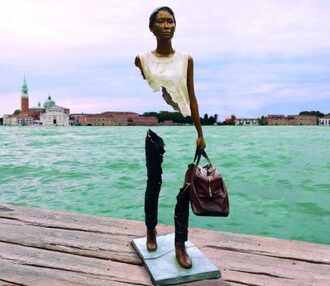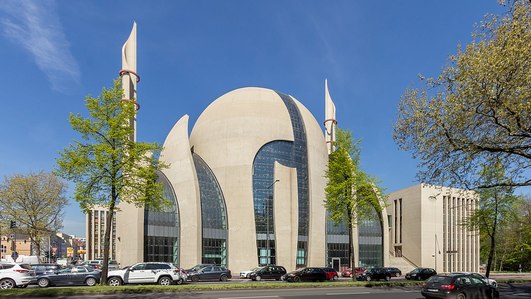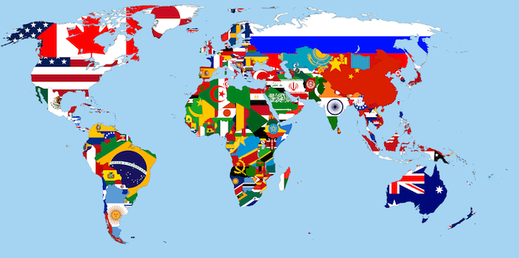democratic decline and highly-skilled (im)mobility
Vichinia by Bruno Catalano, part of the series "Travelers"
Liberal democracy is in decline around the world. With 54% of the world’s population now living in autocracies a new wave of autocratization is in full swing. Meanwhile, the number of highly-skilled emigrants worldwide is on the rise. Acknowledging that migration is a multi-causal phenomenon and autocratization is only one of numerous (e)migration drivers, this project asks: How has democratic decline affected highly-skilled (im)mobility beyond exile and forced migration in the last decade?
An article from this project, entitled "Democratic Decline and Return Migration: What Motivates Voluntary Return to Autocratizing Countries?" is currently under review. Similarly, a special issue that I am co-editing with Zeynep Yanasmayan and Ertug Tombus, entitled (Im)Mobility in and out of Autocratizing States, has been conditionally accepted by Migration Studies and will be published in 2025.
An article from this project, entitled "Democratic Decline and Return Migration: What Motivates Voluntary Return to Autocratizing Countries?" is currently under review. Similarly, a special issue that I am co-editing with Zeynep Yanasmayan and Ertug Tombus, entitled (Im)Mobility in and out of Autocratizing States, has been conditionally accepted by Migration Studies and will be published in 2025.
identity-formation among immigrants from muslim-majority countries in germany
Cologne Central Mosque, built by the Turkish-Islamic Union for Religious Affairs (DITIB) and opened in 2017.
In this stream of research, I explore the diversity among immigrants from Muslim-majority countries in Germany. I specifically highlight the role played by different identity markers and the shortcomings of the widespread tendency to automatically mark these immigrants as "Muslims." Under this rubric, one of my projects focuses on inter- and intra-community dynamics among immigrants from Turkey and Syria in Germany, who self-identify as Muslims. Through in-depth interviews and participant observation, I scrutinize how members of these communities define themselves and how they react to being lumped into the category of “Muslim”. I am especially interested in figuring out how they construct, transgress, or dissolve symbolic boundaries that serve to differentiate them not only from receiving populations but also from each other. Via such emphasis I hope to move beyond the simplifying dichotomy of “Muslim immigrants versus non-Muslim hosts” and highlight other markers of difference that influence the internal dynamics between and among Muslim immigrants. The main output from this project is the article titled "The Politics of Believing and Belonging: Increasing Diversity among Muslim Immigrants in Germany", which was published in the International Migration Review in 2024.
In a second article, which also builds on my interviews with migrants from Turkey and Syria in Germany, I criticize the turn to identity politics in the study of migrants in Europe. I argue that this turn often conflates religion, ethnicity, and nationality, resulting in what I call “categorical astigmatism.” Consequently, migrants find themselves lumped into categories they would not primarily identify with. Second, despite its importance in the lived experiences of migrants, class is treated as a “non-identity” and intra-migrant class differences do not get the attention they deserve. Building on these two criticisms, I conceptualize “categorical astigmatism” to make a plea for categorical clarification. I then suggest the theory of intersectionality as a way out, highlighting the importance of class and its intersection with other markers of difference. The article, entitled "Categorical Astigmatism in the Study of Migrants in Europe: On Ethnicity, Religion, Nationality, and Class in the Study of Migrants in Europe" was published in Ethnic and Racial Studies in 2024.
In a second article, which also builds on my interviews with migrants from Turkey and Syria in Germany, I criticize the turn to identity politics in the study of migrants in Europe. I argue that this turn often conflates religion, ethnicity, and nationality, resulting in what I call “categorical astigmatism.” Consequently, migrants find themselves lumped into categories they would not primarily identify with. Second, despite its importance in the lived experiences of migrants, class is treated as a “non-identity” and intra-migrant class differences do not get the attention they deserve. Building on these two criticisms, I conceptualize “categorical astigmatism” to make a plea for categorical clarification. I then suggest the theory of intersectionality as a way out, highlighting the importance of class and its intersection with other markers of difference. The article, entitled "Categorical Astigmatism in the Study of Migrants in Europe: On Ethnicity, Religion, Nationality, and Class in the Study of Migrants in Europe" was published in Ethnic and Racial Studies in 2024.
CULTURAL POLITICS OF NATIONALISM
Behind my decision to become a sociologist lies my interest in nationalism and national identity formation, which has resulted in several articles: The first, titled, "Lebanon: Parody of a Nation? A Closer Look at Lebanese Confessionalism" was published in Yale Review of International Affairs in 2011. The second, titled, “Coming to Terms with A Difficult Past: The Trauma of the Assassination of Hrant Dink and Its Repercussions on Turkish National Identity” was published in Nations and Nationalism in 2013. A third paper, co-authored with Shai Dromi, and titled “What Does Trauma Have to Do with Politics? Cultural Trauma and the Displaced Founding Political Elites of Israel and Turkey" was published in the Sociological Quarterly (2019). It focuses on the question of how nation-founding elites experience the trauma of the loss of power and how this impacts the way they imagine the nation. Another paper, co-authored with Sinem Adar, and titled "Beyond Affective Polarization: Nationalism and Emotional Disintegration" analyzes the relationship between the global phenomenon of populism and nationalism, and puts forward the concept of “emotional disintegration” to explain the increasing societal polarization that is characteristic of many a nation today. It is currently in progress.
I have also published, with Phil Gorski, two articles on the relationship between nationalism and religion. The first, titled "Religion, Nationalism, and Violence: An Integrated Approach" was published in the Annual Review of Sociology in 2013. The second, titled, "Religion, Nationalism and International Security: Creation Myths and Social Mechanisms" was published in the Routledge Handbook of Religion and Security in 2012.
I have also published, with Phil Gorski, two articles on the relationship between nationalism and religion. The first, titled "Religion, Nationalism, and Violence: An Integrated Approach" was published in the Annual Review of Sociology in 2013. The second, titled, "Religion, Nationalism and International Security: Creation Myths and Social Mechanisms" was published in the Routledge Handbook of Religion and Security in 2012.


